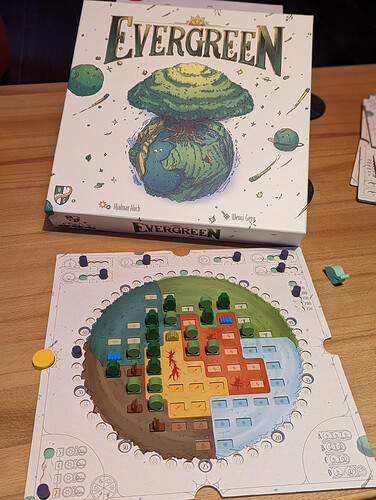Amsterdam, first play. This is the new Queen Games reimplementation of the Stefan Feld classic Macao. Never played the original, so I have nothing to compare it to. You are influential merchants in merchant, getting points by trading various commodities. There are 12 rounds, and each round has four phases. You start by revealing cards from the three decks (craftsmen, buildings, and districts. Each player must take a card, and these go beneath your player board, before being activated (by spending their cost in resources) and moving them above your board where you can then use them. The six dice are rolled, representing the resources. You use two dice, and everyone can use the same dice if they want. Then you place the number of resource cubes onto your roundel. For example, if you took a pink five die, you would place five pink cubes in the five area. Then you rotate your roundel and receive the cubes that are on the exit arrow. Any other cubes (like those five cubes you just took) just move up. So, yes you can take a lot of resources, but you’ll be waiting a while to actually get them. You have to plan carefully, especially since you need to use all your cubes in one turn (but you can keep one resource for the next round, this was added for Amsterdam apparently).
On your turn, you can activate cards, use cards, take a commodity tile from the various coloured districts, load commodities onto your barge, move your barge along, and deliver commodities. Each warehouse in the harbour takes specific goods for victory points. You can also pick up and drop off dock workers for points and money.
Let’s talk penalty tokens. You have five card slots below your board. If you need to place a sixth card, you take a penalty token. So you really want to take cards you know you can activate. Also, any cards left under your board at the end of the game makes you take penalty tokens. At the end of the game, one penalty token is negative three points, the second token is negative five, and then anything else is negative seven points. So they mount up fast. I found myself taking cards not because I wanted their ability, but because I could activate them.
Play was relatively smooth, there’s a lot of icons. Apparently you could pay extra for cards with text instead of icons. I’m ok with icons, much more readable from a distance. But we did spend a bit of time looking up cards – each one is explained in the rules.
Tiletum, first play. More roundels! There’s a lot to think about with this, and a bit of planning involved. It’s a dice placement game. And the dice represent resources. But the higher the dice value, the less actions you get to take. Actions are move your architect, move your merchant, take a character tile (to fill the houses on your player board), fulfil contracts for points, and move up on the king track.
Architects can build pillars on cities, which allow you to help construct the cathedrals on that city. Merchants build houses. You start with a couple of houses and pillars in your supply, to unlock more you need to fill your rooms with people (for houses), and fulfil orders (unlocks pillars). At the end of each round (there are four rounds) you have a fair at a city, which gives you points for various goals (eg points for each house on the board). The first city is always Tiletum, but the others are randomly chosen. And to participate in the scoring of a fair you either need a house there, or your merchant needs to be on that city.
As youfill up your player board, you can bonuses from completing a column of rooms. Like being able to move your architect or merchant to any city (useful for scoring the fairs), putting a house or pillar anywhere, getting resources, or just points. On completing a column, you can also get to place one of your actions tiles on the roundel, which gives you extra actions).
There are only 12 turns in the game (four rounds, and you take three dice each round), but you’ll be chaining actions together. It did get a little confusing. But good fun, looking forward to more games of it.
